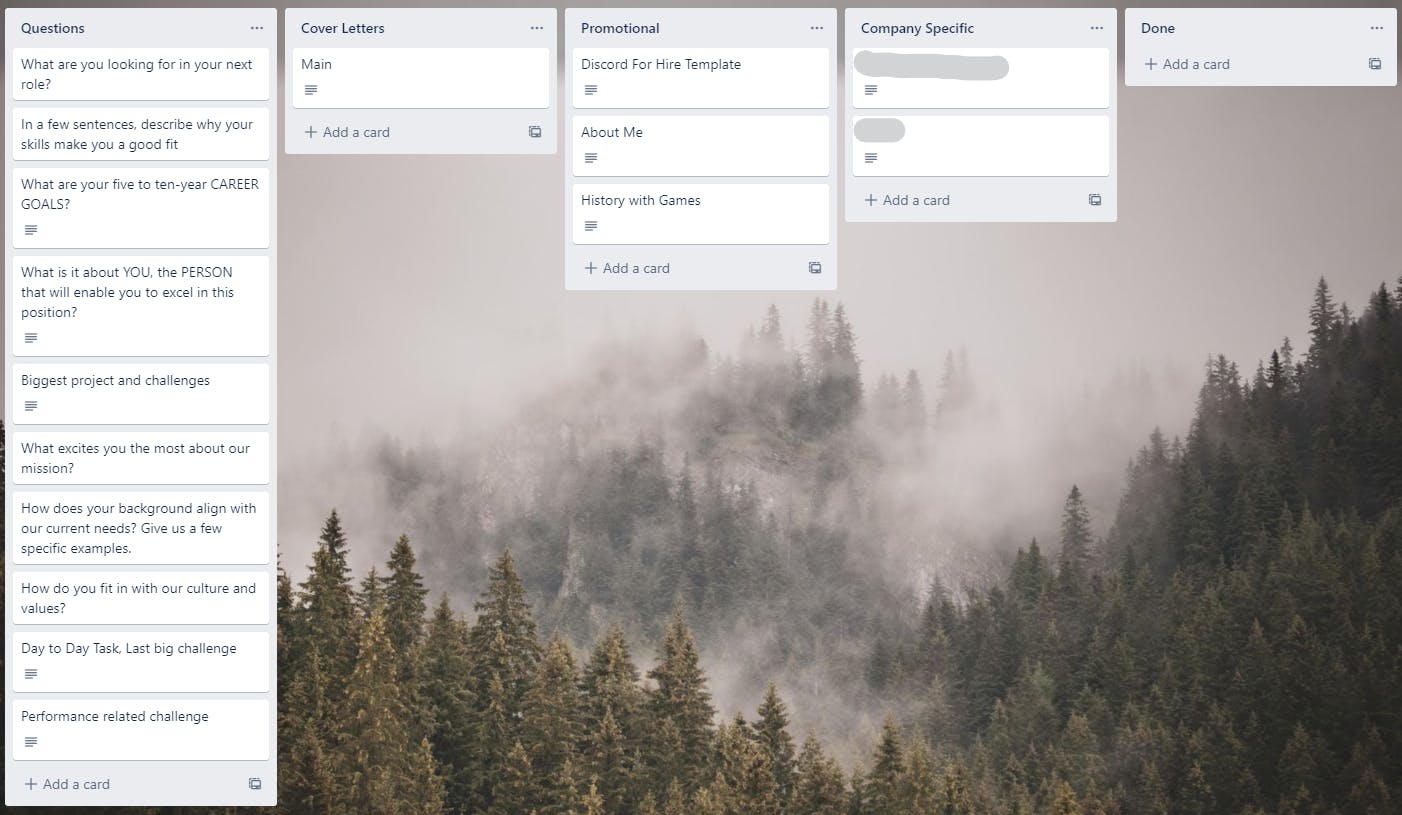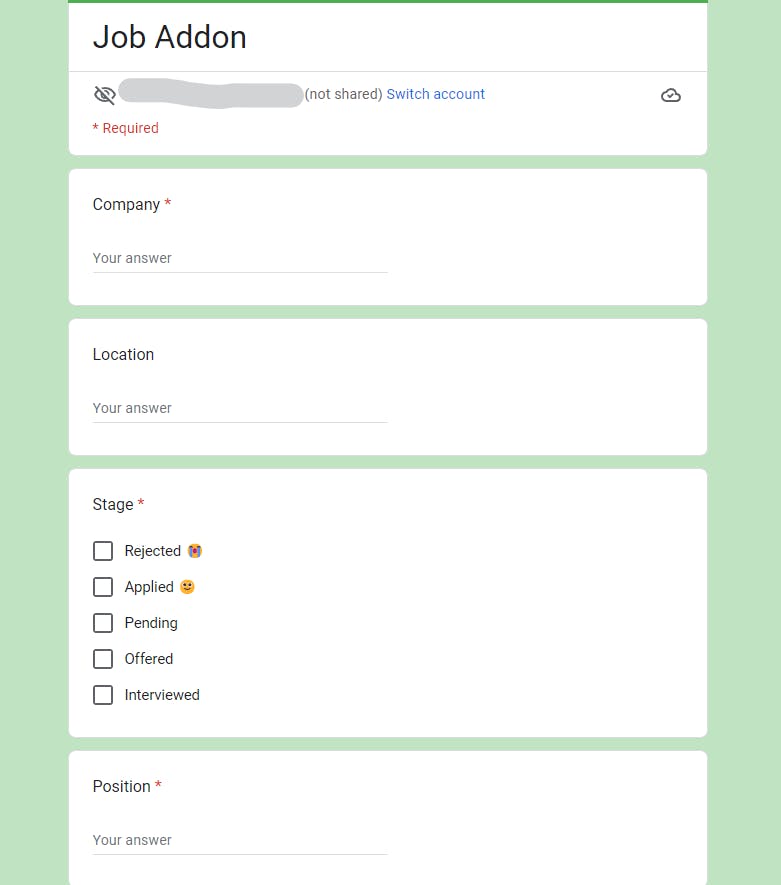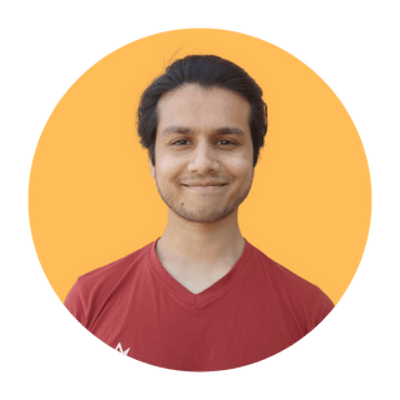Back in 2019 I started looking for a job and got a job in 3 months.
My process wasn't as refined as it is now but I had a few things in place that I still do.
Creating a Resume and Cover Letter
The first thing you need to understand is that these documents will never stay static you need to constantly update them and try to make them better depending on what works for you.
When I started, I created a simple Google Document and saved all the snippets there, this allowed me to vary my cover letter each time and I could easily tailor it to the specific company.
You should write a targeted cover letter for each company but you shouldn’t have to rewrite it from scratch.
The same advice goes with the Resume. You will constantly have ideas and gain more knowledge about how to optimize your resumes, so keep a log of the data of your resume and keep improving it.
Your goal should be to portray your skills and accomplishments in the best way possible.
Nowadays I track all my cover letters and other snippets in Trello, it’s far easier to find the text I’m looking for and I also save the full text of the cover letter that I have sent to companies so I know what I did differently with each.
This is what it looks like:

Track, Track, Track
I tracked every job I applied to in a spreadsheet, and I noted down things like the date of application, things I liked/disliked about the place, and contact information. This information has helped me a lot whenever I get to the next stage.
It also helps a lot to know how many jobs you have applied to and how many responses you are getting.
I have tried to do this in other tools like Notion or Trello but they simply don’t give you enough control to derive the data. The bonus skill here is that you will learn a lot of Excel!
I have also created a Job Form with Google forms so I can quickly enter each company I have applied to rather than doing it manually in Excel.
Here’s what it looks like:

Apply fast, Accept slow
When you interview with a company, you need to hold them to the same criteria as they are holding you.
So, if you finally get a job offer from someplace, be sure to write down all of the positives and negatives and compare them with any other offers you might have.
If you don’t have any other offers and the company does not raise any red flags, only then you should accept it.
If it’s your first job, your priority should be growth. So, you should be looking for a company whose culture aligns with your personal and professional goals.
A lot of my friends made the mistake of accepting their first offer and later realized that their goals did not align with the organization's goals.
This advice is only for those who have some wiggle room in which company they want to work for.
For me, the first company that contacted me did not respect my time at all, they called late at night and asked me to come early the next morning for an interview, I had to travel from a different city.
I decided to skip that interview and looked for someplace else. If the company does not respect your time and commitment now, they won’t do that later either.
Projects Matter, Have a Portfolio
Everyone has projects, I have several fellows who have done a lot of side projects but ask them to show you those and they will send you a zip file and ask you to build it.
I had the little foresight of uploading everything I had on GitHub and hosting it on Heroku, I was able to send those links to potential recruiters so they could look at the projects I have done.
It does not matter how many projects you have done, if you cannot show them as fast as possible you might as well not have done them.
People don’t realize how much value they can get out of a project; it does not end with you creating it and closing the IDE.
You can:
Host it somewhere
Share it on social media
Write an article about it, share your struggles, how you overcame them, and what you learned
Stop looking for ideas, just copy something
If you have less than 1 project right now, you should be building something.
Don’t spend days brainstorming for new ideas when you can steal ideas. These projects are not going to be permanent.
At this point, you need projects that showcase your programming abilities. They don’t need to be super complex. It’s better to have a simple project to show than a complex idea that you never implemented.
If you have only done tutorials so far, you need to be able to set up projects on your own and take them to the finish line. What you need is practice and a lot of it.
Building a clone of sites like Netflix, Spotify, and Twitter will bring you closer to getting a job. If you want to make it yours, add something in them that you would have liked to see in the original product.
Takeaways - TL;DR
- Create a resume and cover letter and continuously optimize it
- Keep a record of the jobs you apply to and create a system to track them
- Think about the type of company you want to join
- Create an online portfolio, showcase your projects, and share them with the world
- Ideas are easy, implementation is hard. Create something, don't overthink.

